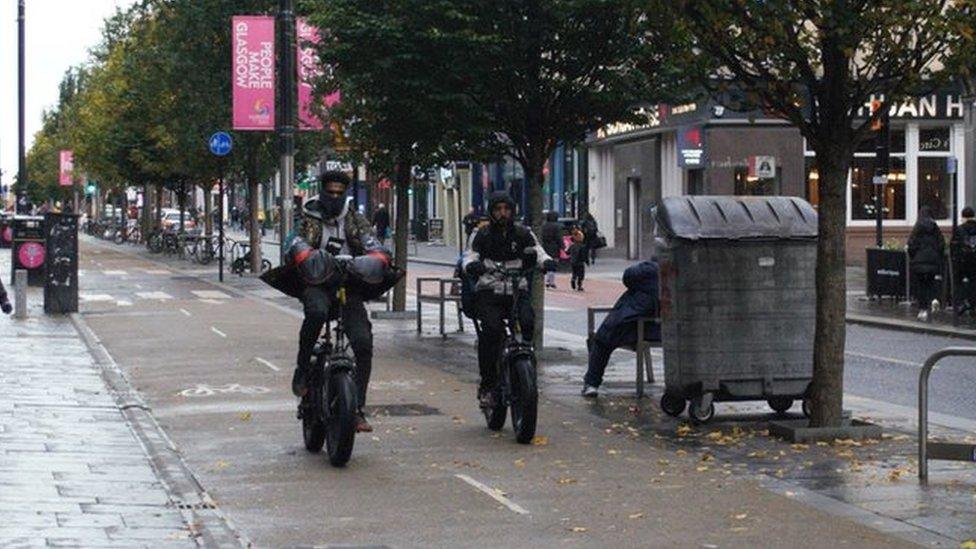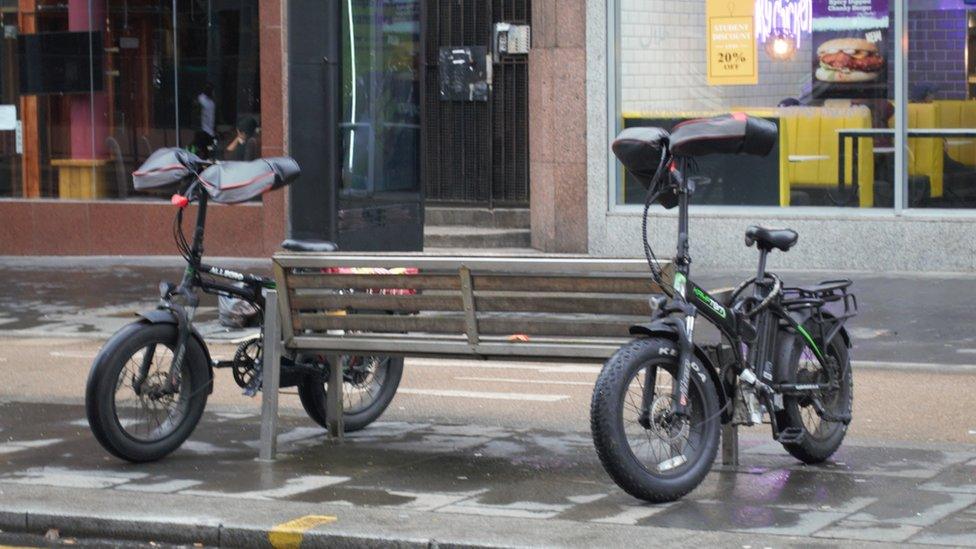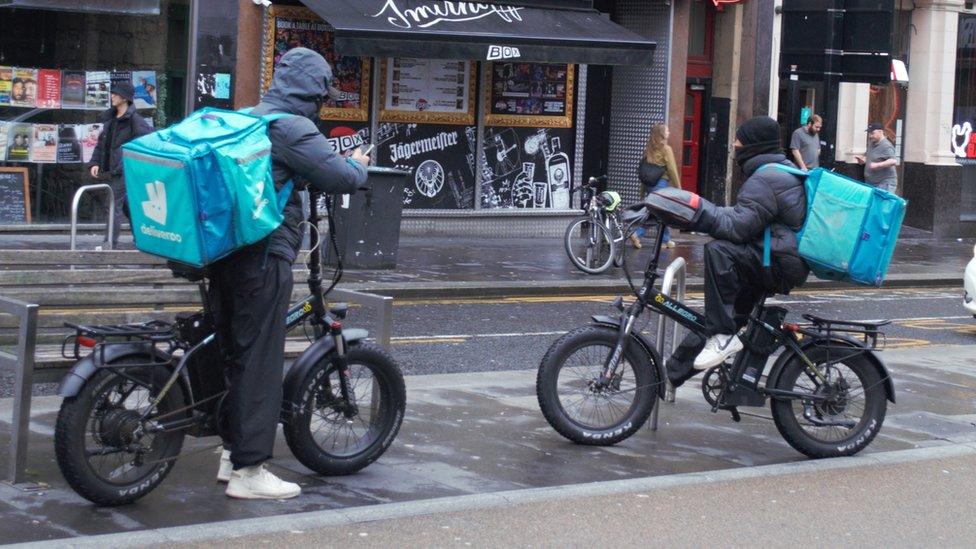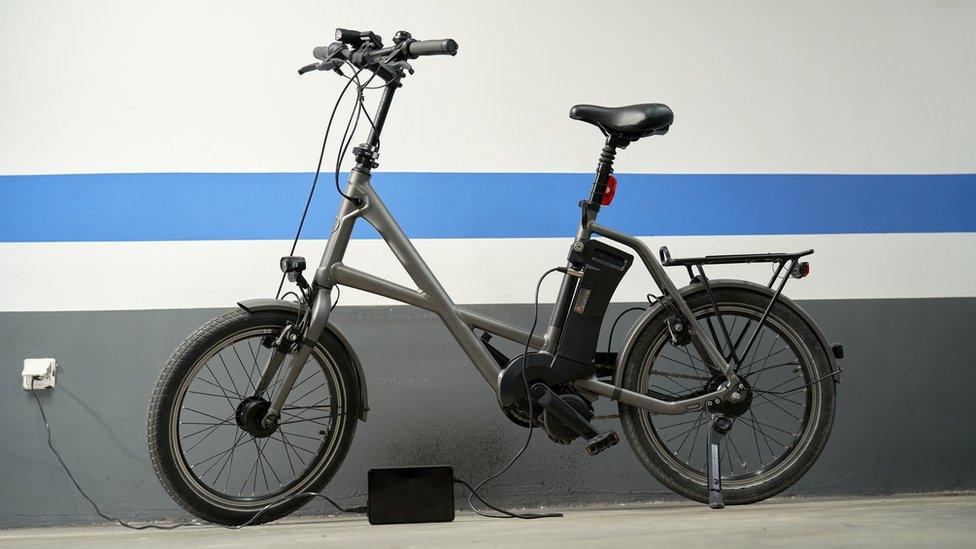‘I’m terrified of e-bikes after food courier smash’
- Published

E-bikes have become increasingly popular over the last few years
A Scottish cycling charity is backing calls for more responsible use of e-bikes after a cyclist claimed he was mown down by a food delivery driver.
Ben Williams was left "terrified" after suffering a serious injury during a collision in Glasgow last year.
He was cycling home on a two-lane cycle path when he was hit by an electric bike ridden by a food delivery courier travelling the wrong way.
Cycling Scotland said delivery companies should take responsibility.
Mr Williams, a 24-year-old PhD student, fell from his bike and hit the kerb after the crash. He had to be treated in hospital for a torn kidney.
He now wants to raise awareness of how dangerous the electric bikes can be when not used properly.
"I remember getting told off by the nurses for carrying my own bag they were like 'no you can't do that you've got to take it really easy,'" he said.
"I had to move from Glasgow back to my parents home in Manchester because I couldn't lift anything and I couldn't walk anywhere."

It took months for PhD student Ben Williams to recover after being hit by an e-bike
He said he thought the e-bike was travelling at 15mph when it hit him and he now tries to avoid them when he is out cycling.
"When I think back, the guy must have been on his phone because there is no way we would have collided if he was paying any attention," said Mr Williams.
"I'm terrified of them, the amount of times I have had an e-bike come down the cycle lane at full chap. I just move out of the way now. Why risk it, I don't want to get hurt again," he said.
Couriers using e-bikes with wide tyres and handlebar gloves have become a common sight in cities across Scotland.

Food delivery couriers are commonly seen using e-bikes with wide tyres and handlebar gloves
Cycling Scotland's road safety manager, Simon Bradshaw, said better police enforcement would send a message but if the issue was to be addressed long term then the food delivery companies needed to take more responsibility for the actions of their riders.
"A simple thing would be are companies actually checking the bikes that the riders are using to make sure that they are legal," he said.
"If the riders are given effective training around cycling safety, if their bikes are checked to make sure that their bikes are legal and road worthy and if they're given effective training and support and the right safety equipment then I'm sure that would make a difference," he added.
But the general secretary of the Scottish Police Federation, David Kennedy, told BBC Radio Scotland's Drivetime programme that some of the bikes being used across Scotland were "absolutely" not meeting those standards.
"That's very well knowing that, but how do you tell just by looking at a bike how fast it is or the power of it," he said.
"The problem we have is there is not enough police officers on the street to deal with it."

Cycling Scotland is calling for food delivery companies to take more responsibility over their couriers
He said many people were not educated on the laws surrounding e-bikes and may unknowingly be buying bicycles which are actually classed under UK law as mopeds.
"People always think if I can buy it, it must be legal not realising no in actual fact it's legal to buy it - but not use it on the road."

What are the rules around e-bikes?
An electric bicycle or an e-bike as they are commonly known are bicycles which use electricity to assist the rider in cycling but are not meant to replace pedalling.
In the UK they are classed as a type of bicycle called electrically assisted pedal cycles (EAPC).
That means they can be used on bike paths, cycle lanes and roads but are not allowed on pavements. They must also stop at stop signs and red lights and riders must use hand signals to turn.
E-bikes in the UK are only allowed to assist the person up to 15.5mph (25kph) after which point it must cut out and the person must use pedal power alone to go faster.
Any e-bike which continues to assist the rider after 15.5mph or does not require them to pedal at all are actually treated like petrol powered mopeds under UK law and are not classed as EAPCs.
That means it is illegal to use those type of e-bikes without a licence, they can only be ridden on roads or unrestricted byways, a helmet must be worn when using one and they have to be taxed and insured.
You have to be aged 14 or over to use an EAPC.
E-bikes are increasingly popular, and campaigners say those which meet EAPC standards are just as safe as regular bikes, as their motors only assist until the rider reaches the speed of an average cyclist.

Food delivery companies said safety was a top priority for them.
A spokesperson for Just Eat said it took appropriate action when made aware a courier delivering on their behalf did not uphold their standards.
An Uber Eats spokesperson said they expected their couriers to adhere to all applicable laws and regulations.
Deliveroo said riders complete a programme of road safety guidance and are offered equipment to ensure they are visible to all road users.
Related topics
- Published9 June 2023
